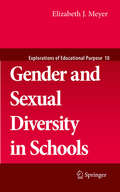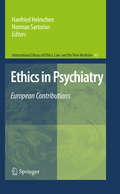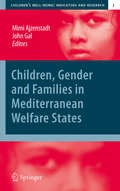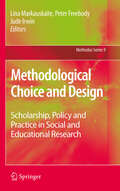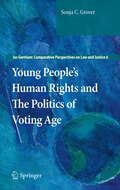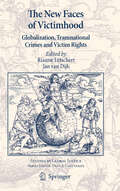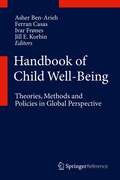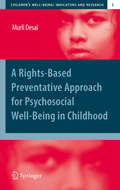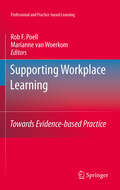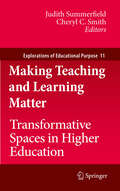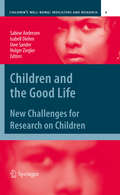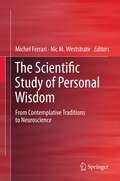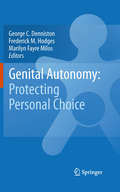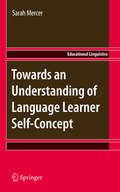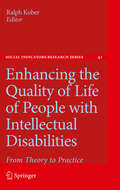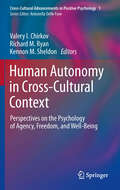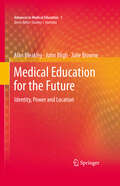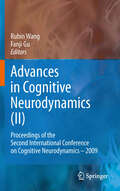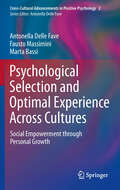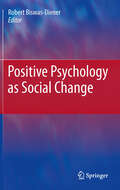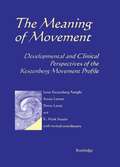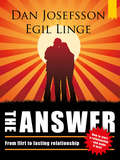- Table View
- List View
Brain Protection in Schizophrenia, Mood and Cognitive Disorders
by Michael S. RitsnerNeuroprotection is a novel perspective for the treatment of disorders that lead to neurodegeneration and disabilities as a result of deterioration of neurons due to apoptosis, oxidative stress, excitotoxicity, and other mechanisms. These mechanisms have implications not only for neurodegenerative disorders, but also for schizophrenia, mood and cognitive disorders. The purpose of this book is to provide an up-to-date overview of basic and clinical studies concerning the neuroprotective approach, mechanisms, and several compounds with neuroprotective properties that may contribute to more efficacious treatment of major mental health disorders. The book is divided into two sections. The first section serves as an introduction and overview of conceptual issues of the neuroprotective approach, and some neurobiological advances. Chapters in this section review definitions, perspectives, and issues that provide a conceptual base for the rest of the book. In addition, this part includes chapters in which the authors present and discuss the findings from basic studies of neurodegenerative mechanisms that are associated with the pathogenesis of major mental health disorders. The second section focuses on findings obtained from clinical trials with neuroprotective compounds, and neuromodulatory techniques. The take-home message is that principles of the neuroprotective approach may be applied to treatment of schizophrenia, mood and cognitive disorders. Contributors to this book are among the most active investigators and clinicians in the field who provide new perspectives not only clarifying ongoing controversies but also propose diverse aspects and new insights to neuroprotection. This book is intended for a broad readership, which includes a broad spectrum of readers including neuroscientists, psychiatrists, neurologists, pharmacologists, clinical psychologists, general practitioners, geriatricians, graduate students, and policy makers in the fields of mental health.
Gender and Sexual Diversity in Schools
by Elizabeth J. MeyerIssues related to gender and sexual diversity in schools can generate a lot of controversy, with many educators and youth advocates under-prepared to address these topics in their school communities. This text offers an easy-to-read introduction to the subject, providing readers with definitions and research evidence, as well as the historical context for understanding the roots of bias in schools related to sex, gender, and sexuality. Additionally, the book offers tangible resources and advice on how to create more equitable learning environments. Topics such as working with same-sex parented families in elementary schools; integrating gender and sexual diversity topics into the curriculum; addressing homophobic bullying and sexual harassment; advising gay-straight alliances; and supporting a transgender or gender non-conforming student are addressed. The suggestions offered by this book are based on recent research evidence and legal decisions to help educators handle the various situations professionally and from an ethical and legally defensible perspective.
Ethics in Psychiatry: European Contributions
by Hanfried Helmchen Norman SartoriusEthics in Psychiatry: (1) presents a comprehensive review of ethical issues arising in psychiatric care and research; (2) relates ethical issues to changes and challenges of society; (3) examines the application of general ethics to specific psychiatric problems and relates these to moral implications of psychiatry practice; (4) deals with recently arising ethical problems; (5) contains contributions of leading European ethicists, philosophers, lawyers, historians and psychiatrists; (6) provides a basis for the exploration of culture-bound influences on morals, manners and customs in the light of ethical principles of global validity.
Children, Gender and Families in Mediterranean Welfare States (Children’s Well-Being: Indicators and Research #2)
by John Gal Mimi AjzenstadtThe study of welfare states and social policy has enjoyed growing popularity in the last three decades. This field has been characterized by a growing level of theorization, richer case study analyses, inclusion of additional sources of welfare provision (non-profit, market-based, informal, family) and fields of study (globalization, gender, ethnicity, immigration, children), and increasingly complex, accurate and up-to-date cross-national comparative analyses. One of the subjects that have been the focus of much interest has been that of families, women and children - their social well being and their legal and economic status in the welfare state. The common assumption is that there is a clear relationship and interaction between the structuring of the welfare state and the well-being and social status of these subs groups. Cross-national comparative analyses have shown that this interaction differs significantly from country to country, depending on the culture, religion as well as on its welfare regime. Scholars are engaged in diverse efforts to understand the differences between these policies in diverse welfare states, the reasons for these differences and their results. This volume deals with these issues from a unique welfare regime perspective. While over the last two decades research on welfare states has generally tended to assume that these nations can be divided into welfare regimes with common characteristics, there has been much ambivalence towards, and much less study of, the welfare states in the Mediterranean region. This volume focuses on these welfare states and makes the case for regarding the nations in this region as belonging to a common family of nations. It then seeks to compare policies towards children, families and gender in these nations. The volume will seek to further this research agenda by including an initial section that offers an overview of the Mediterranean welfare states, and then discusses issues of children, families and gender in general. The second part of the book will offer detailed country studies of these issues, all authored by leading experts in the various countries.
Methodological Choice and Design
by Lina Markauskaite Peter Freebody Jude IrwinBeginning and well-seasoned researchers alike face significant challenges in understanding the complexities of research designs arising from both within and across methodological paradigms, and in applying them in ways that maximise impact on knowledge, practice, and policy. This volume engages educational and social researchers in a scholarly debate offering some crucial re-interpretations of established research methodologies in light of contemporary conditions and critical introduction to some contemporary research approaches yet to gain general recognition. This book is a contemporary vademecum for researchers, practitioners and graduate students on research methodologies and designs for educational and social change in today's world. The chapters chart and analyse the conceptual and practical complexities of a variety research designs for contemporary educational and social work research. This anthology, taken overall, provides readers with the knowledge and understanding needed not only to design technically sound and coherent research studies, but also to develop methodologically innovative research projects that cross the boundaries between different methodological traditions to the benefit of scholarship, policy, and practice. The chapters cover nine research approaches: - Design-based research - Action research - Ethnomethodological research - Negotiated ethnography - Arts-informed research - Historical analysis and postcolonial scholarship - Policy analysis - Comparative research - Quantitative modelling of correlational and multi-level data The book provides a critical discussion of epistemological questions and methodological frontiers: - Knowledge and epistemology in scholarship, practice and policy - Digital knowledge and digital research - Emerging methodological challenges for educational research - Challenges and futures for social work and social policy research methods - Methodology and the knowledge industry
Young People’s Human Rights and the Politics of Voting Age
by Sonja C. GroverYoung People's Human Rights and The Politics of Voting Age explores the broader societal implications of voting age eligibility requirements and the legislative bar against youth voting in North America and in Commonwealth countries (where 'youth' is defined as persons 16 and over but under age 18). The issue is raised as to whether the denial of the youth vote undermines democratic principles and values and ultimately the human dignity of youth. This is the first book to address the topic of the youth vote in-depth as a fundamental human rights concern relating to the entitlement in a democracy to societal participation and inclusion in influencing policy and law which profoundly affects one's life. Also examined are international perspectives on the issue of voting age eligibility. The book would be extremely valuable for instructional purposes as one of the primary texts in undergraduate or graduate courses on children's human rights, political psychology, political science , sociology of law or society and as a supplementary text for courses on human rights or constitutional law and would be of interest also to members of the general public concerned with children's human rights issues.
The New Faces of Victimhood
by Jan Van Dijk Rianne LetschertBesides generating wealth, globalization makes victims, including victims of new forms of crime. In this edited book of scholarly essays, international lawyers and criminologists reflect on the legal challenges posed by these dark sides of globalization. Examples include transnational organised crime, human trafficking and corruption, cyber crimes, international terrorism, global corporate crime and cross-border environmental crimes. The authors reflect on the limits of domestic systems of justice in providing protection, empowerment and redress to the victims of these emerging forms of global insecurity. They argue for the need of better international or supra-national institutional arrangements such as legal instruments and actions of the United Nations or regional organizations such as the European Union. In part I Jan Van Dijk and Rianne Letschert present an overview of trends in criminal victimization against the backdrop of globalization using a unique set of statistical indicators. By placing this issue in the framework of the human security concept, the authors draw out its broader political and normative implications. Theologist Ralf Bodelier explains how modern communication technologies have heightened sensitivities among the general public for human insecurities anywhere in the world. In his view, a new global conscience is in the making that may become the cornerstone of international solidarity and action. Marc Groenhuijsen and Rianne Letschert describe the emergence of national and international legal and institutional arrangements to offer remedies to victims of crime in an era of globalization. In part II a selection of experts analyse the specific issues surrounding the protection and empowerment of victims of different types of international crimes such as human trafficking, organised crime/corruption, terrorism, global corporate crime and cross border environmental crimes. In part III focused attention is given to the special challenges and opportunities of protecting and assisting crime victims in cyberspace. Part IV deals with emerging victim issues in humanitarian law such as the accountability of private military companies and the implementation of the ambitious victim provisions in the statute of the International Criminal Court including the establishment of a global fund for reparations. In the final part of the book some of its core authors formulate their ideas about the international institutional arrangements that should be put in place to offer justice to the victims of globalization. A concrete proposal is made for the transformation of the United Nations 1985 Declaration on the Principles of Justice for Victims of Crime and Abuse of Power into a full-fledged UN convention. In the final chapter further proposals are made for the increased involvement of regional organisations such as the European Union in the protection of victims of global crime.
Handbook of Child Well-Being
by Asher Ben-Arieh Ferran Casas Ivar Frønes Jill E. KorbinThe well-being of children represents a challenge not yet fully confronted and The Handbook of Child Well-being supplies its readers with a thorough overview of the complexities and implications regarding the scientific and practical pursuit of children's well-being. The handbook addresses the concept of well-being through an in-depth analysis of the perspectives and vocabularies of various disciplines such as, philosophy, theology, psychology and sociology. It covers important issues in child well-being and the problems of the general politics of well-being as well as the implementation of interventional programs and measures. In addition the handbook deals with the methods of measuring well-being for a scientifically grounded understanding and also for policy-making. The interdisciplinary set up of the handbook makes it a unique work that offers readers from a vast scope of child-related disciplines and professions a profound overview of the complexities and implications of the scientific and practical pursuit of children s well-being. "
A Rights-Based Preventative Approach for Psychosocial Well-being in Childhood (Children’s Well-Being: Indicators and Research #3)
by Murli DesaiChildren are one of the most important phase of human development and the most important target group for social work intervention. Most of the schools of human development and social work round the world have an elective course on children and some offer a concentration in this area. There are plenty of textbooks on intervention with children published by Western authors, focusing on useful theories and skills but mainly at the remedial level. They neither use the preventative approach nor the child rights perspective, which has been found useful in the developing nations. The books on child rights are generally published by the United Nations Children's Fund (UNICEF) and other international organisations working in the field of children such as Save the Children. These books focus on the useful child rights perspective but they neither integrate theories nor use the preventative approach. The proposed book A Rights-based Preventative Approach for Children's Psychosocial Well-Being: will be the first to apply the child rights perspective and the preventative approach to intervention for children's psychosocial well-being. It is an integration of theories with practice and teaching relevant in different parts of the world. The book is divided into the following three parts: Part 1: Introduction to a Rights-based Preventative Approach for Children's Psychosocial Well-Being.- Part 2: Primary Prevention for Children's Psychosocial Well-Being.- Part 3: Secondary and Tertiary Prevention for Children's Psychosocial Well-Being
Supporting Workplace Learning: Towards Evidence-based Practice
by Marianne Van Woerkom Rob F. PoellDuring the 1990s, the workplace was rediscovered as a rich source of learning. The issue of workplace learning has since received increasing attention from academics and practitioners alike but is still under-researched empirically. This book brings together a range of state-of-the-art research papers addressing interventions to support learning in the workplace. The authors are experienced international scholars who have an interest in making HRD and workplace learning practices more evidence-based through practical relevant research. Although workplace learning is largely an autonomous process, many organizations want to manage it as part of their broader HRD strategy. There are limits, however, to the extent to which the complex dynamics of learning in the workplace can be guided in pre-determined desirable directions. This tension between the possible strengths of workplace learning and the limits of managing it is at the heart of this volume. The book is broken into three sections. The first section deals with workplace learning interventions, including HRD practitioners' strategies, training and development activities, and e-learning programs. The second section investigates the impact of social support, or lack thereof, in workplace learning, such as mentoring, coaching, and socialization practices. The third section addresses collective learning in the workplace, looking at teams, knowledge productivity, and collaborative capability building.
Directions and Prospects for Educational Linguistics
by Francis M. HultDirections and Prospects for Educational Linguistics explores innovations that have developed from the creative syntheses of diverse methodological and theoretical approaches used to explore a broad rang of issues and topics related to language (in) education. The volume provides unique insights into current practices and new frontiers for educational linguistics by bringing together contributions from scholars who draw upon on established research traditions while at the same time pushing their boundaries beyond the confines of specific disciplines. Each paper serves as a thought provoking starting point for scholars and advanced graduate students to contemplate directions and prospects for research that contributes to linguistically appropriate and socially responsible education.
Making Teaching and Learning Matter
by Judith Summerfield Cheryl C. SmithThis volume captures the spirit of collaboration and innovation that its authors bring into the classroom, as well as to groundbreaking undergraduate programs and initiatives. Coming from diverse points of view and twenty different disciplines, the contributors illuminate the often perplexing debates about what matters most in higher education today. Each chapter tells a unique story about creating vital pedagogical arenas that have the potential to transform teaching and learning for both faculty and students. These exploratory spaces include courses under construction, cross-college and interdisciplinary collaborations, general education reform initiatives, and fresh perspectives on student support services, faculty development, freshman learning communities, writing across the curriculum, on-line degree initiatives, and teaching and learning centers. All these spaces lend shape to an over-arching, system-wide project bringing together the often disconnected silos of undergraduate education at The City University of New York (CUNY), America's largest urban public university system. Since 2003, the University's Office of Undergraduate Education has sponsored coordinated efforts to study and improve teaching and learning for the system's 260,000 undergraduates enrolled at 18 distinct colleges. The contributors to this volume present a broad spectrum of administrative and faculty perspectives that have informed the process of transforming the undergraduate experience. Combined, the voices in these chapters create a much-needed exploratory space for the interplay of ideas about how teaching and learning need to matter in evolving notions of higher education in the twenty-first century. In addition, the text has wider social relevance as an in-depth exploration of change and reform in a large public institution.
Children and the Good Life: New Challenges for Research on Children (Children’s Well-Being: Indicators and Research #4)
by Uwe Sander Sabine Andresen Isabell Diehm Holger ZieglerIn April 2009, an inspiring international conference was held at Bielefeld on the topic "Children and the Good Life: New Challenges for Research on Children." The focus was on how we can define and measure a "good life" for children growing up in the modern world. This tied in with discussions on how convincing universalistic theories are, what research on children can contribute, and how children themselves can be integrated into the research process and debates on the "good life." Discourses and the production of knowledge on the "good life" or "well-being" require a guiding idea or a theoretical frame. This frame can come from the feminist ethic of care or from the Human and Children's Rights Convention, from the idea of welfare, or from the Capability Approach.
The Scientific Study of Personal Wisdom: From Contemplative Traditions to Neuroscience
by Michel Ferrari and Nicholas WeststrateThe rich and diverse contributions to this volume span a wide variety of disciplines, from psychology and philosophy to neuroscience, by some of the most influential scholars in the emerging science of personal wisdom. As such, it is a collection of essential readings and the first publication to integrate both the spiritual and pragmatic dimensions of personal wisdom.The content of the book goes beyond speculative theory to present a wealth of scientific research currently under way in this expanding field. It also describes numerous promising methods now being deployed in the quest for scientific knowledge of the elusive, yet critical, phenomenon of personal wisdom. The book is an excellent introduction to the field for novice researchers as well as a stimulating and enlightening resource for established experts. Its broad appeal makes it a vital addition to the libraries of academics and practitioners in many disciplines, from developmental psychology to gerontology, and from philosophy to contemplative religious traditions such as Buddhism.
Genital Autonomy:
by Frederick M. Hodges Marilyn Fayre Milos George C. DennistonCircumcision affects 15.3 million children and young adults annually. In terms of gender, 13.3 million boys and 2 million girls are subjected to the involuntary removal of part or all of their external sexual organs every year. The problem of female circumcision has been addressed on an international level, but male circumcision remains a controversial subject that many academics have been reluctant to examine. Circumcision is tolerated today because it has been practiced for millennia by a small but vocal minority of religious and ethnic groups, however, when the practice is examined through the lens of modern legal, ethical, and human rights advancements, no place remains in civilized society for this body-altering ritual. In Genital Autonomy: Protecting Personal Choice, international experts address various types of genital modifications, the impact of these harmful traditional practices on the child, on human rights, and on the development of the concept of bodily integrity. The papers presented in this volume address these topics from a variety of angles. They question and dissects the true motivations of the doctors, witch doctors, and "holy men" who promote and profit from circumcision.
Towards an Understanding of Language Learner Self-Concept
by Sarah MercerThis book contributes to our growing understanding of the nature and development of language learner self-concept. It assesses the relevant literature in the disciplines of psychology and applied linguistics and describes in-depth, qualitative research examining the self-concepts of tertiary-level EFL learners. Although researchers in applied linguistics and SLA have recognized the importance of self-constructs, there remains little empirical work in the context of foreign language learning that focuses exclusively and at length on this central psychological construct. The content of this monograph draws on interdisciplinary sources, with input from psychology and applied linguistics. It will appeal to students and researchers interested in language-learner psychology as well as self-related constructs in general. The text provides insights into how learners view themselves, and how these self-beliefs can develop and affect the progress of an individual's language learning.
Enhancing the Quality of Life of People with Intellectual Disabilities
by Ralph KoberThis book contains a series of articles, written by international experts in the fields of intellectual disability and quality of life, that explore a broad range of issues that impact on the quality of life of people with intellectual disabilities and their families. The book commences with a general discussion on defining quality of life and family quality of life and the appropriateness of using these constructs in the field of intellectual disability, and is followed by an analysis on the effects of living arrangements and employment on quality of life. The book concludes with discussions on the unique issues facing children with intellectual disabilities and people living in developing countries and the effect these issues have upon their quality of life.
Human Autonomy in Cross-Cultural Context
by Richard Ryan Kennon M. Sheldon Valery I. ChirkovThis volume presents the reader with a stimulating tapestry of essays exploring the nature of personal autonomy, self-determination, and agency, and their role in human optimal functioning at multiple levels of analysis from personal to societal and cross-cultural. The starting point for these explorations is self-determination theory, an integrated theory of human motivation and healthy development which has been under development for more than three decades (Deci & Ryan, 2000). As the contributions will make clear, psychological autonomy is a concept that forms the bridge between the dependence of human behavior on biological and socio-cultural determinants on the one side, and people's ability to be free, reflective, and transforming agents who can challenge these dependencies, on the other. The authors within this volume share a vision that human autonomy is a fundamental pre-condition for both individuals and groups to thrive, and that without understanding the nature and mechanisms of autonomous agency vital social and human problems cannot be satisfactory addressed. This multidisciplinary team of researchers will collectively explore the nature of personal autonomy, considering its developmental origins, its expression within relationships, its importance within groups and organizational functioning, and its role in promoting to the democratic and economic development of societies. The book is aimed toward developmental, social, personality, and cross-cultural psychologists, towards researchers and practitioners' in the areas of education, health and medicine, social work and, economics, and also towards all interested in creating a more sustainable and just world society through promoting individual freedom and agency. This volume will provide a theoretical and conceptual account of the nature and psychological mechanisms of personal motivational autonomy and human agency; rich multidisciplinary empirical evidence supporting the claims and propositions about the nature of human autonomy and capacities for self-regulation; explanations of how and why different psychological and socio-cultural conditions may play a role in promoting or undermining people's autonomous motivation and well-being, discussions of how the promotion of human autonomy can positively influence environmental protection, democracy promotion and economic prosperity.
Medical Education for the Future
by John Bligh Julie Browne Alan BleakleyThe purpose of medical education is to benefit patients by improving the work of doctors. Patient centeredness is a centuries old concept in medicine, but there is still a long way to go before medical education can truly be said to be patient centered. Ensuring the centrality of the patient is a particular challenge during medical education, when students are still forming an identity as trainee doctors, and conservative attitudes towards medicine and education are common amongst medical teachers, making it hard to bring about improvements. How can teachers, policy makers, researchers and doctors bring about lasting change that will restore the patient to the heart of medical education? The authors, experienced medical educators, explore the role of the patient in medical education in terms of identity, power and location. Using innovative political, philosophical, cultural and literary critical frameworks that have previously never been applied so consistently to the field, the authors provide a fundamental reconceptualisation of medical teaching and learning, with an emphasis upon learning at the bedside and in the clinic. They offer a wealth of practical and conceptual insights into the three-way relationship between patients, students and teachers, setting out a radical and exciting approach to a medical education for the future. "The authors provide us with a masterful reconceptualization of medical education that challenges traditional notions about teaching and learning. The book critiques current practices and offers new approaches to medical education based upon sociocultural research and theory. This thought provoking narrative advances the case for reform and is a must read for anyone involved in medical education." - David M. Irby, PhD, Vice Dean for Education, University of California, San Francisco School of Medicine; and co-author of Educating Physicians: A Call for Reform of Medical School and Residency "This book is a truly visionary contribution to the Flexner centenary. It is compulsory reading for the medical educationalist with a serious concern for the future - and for the welfare of patients and learners in the here and now." Professor Tim Dornan, University of Manchester Medical School and Maastricht University Graduate School of Health Professions Education.
Advances in Cognitive Neurodynamics: Proceedings of the Second International Conference on Cognitive Neurodynamics - 2009 (Advances in Cognitive Neurodynamics)
by Fanji Gu Rubin WangWithin our knowledge, the series of the International Conference on Cognitive Neurodynamics (ICCN) is the only conference series dedicating to cognitive neurodynamics. This volume is the proceedings of the 2nd International Conference on Cognitive Neurodynamics held in 2009, which reviews the progress in this field since the 1st ICCN -2007. The topics include: Neural coding and realistic neural network dynamics, Neural population dynamics, Firing Oscillations and Patterns in Neuronal Networks, Brain imaging, EEG, MEG, Sensory and Motor Dynamics, Global cognitive function, Multi-scalar Neurodynamics - from Physiology to Systems Theory, Neural computing, Emerging Technologies for Brain Computer Interfaces, Neural dynamics of brain disorders.
Psychological Selection and Optimal Experience Across Cultures
by Fausto Massimini Marta Bassi Antonella Delle FaveWhat does Western science know about the relationship between individual well-being and cultural trends? What can learn from other cultural traditions? What do the recent advancements in positive psychology teach us on this issue, particularly the eudaimonic framework, which emphasizes the connections between personal well-being and social welfare? People grow and live in cultures that deeply influence their values, aspirations and behaviors. However, individuals in their turn play an active role in building their own goals, growth trajectories and social roles, at the same time influencing culture trends. This process, defined psychological selection, is related to the individual pursuit of well-being People preferentially select and cultivate in their lives activities, interests, and relationships associated with optimal experience, a state of deep engagement, concentration, and enjoyment. Several cross-cultural studies confirmed the positive and rewarding features of optimal experience. Based on these evidences, this book offers a new perspective in the study of human behavior. Highlighting the interplay between individual and cultural growth trajectories, it conveys a core message: educating people to enjoy engagement and involvement in activities that can be relevant and meaningful for social welfare is a premise to foster the harmonious development of human communities, and the peaceful cohabitation of cultures.
Positive Psychology as Social Change
by Robert Biswas-DienerIn recent times there has been growing interest in positive psychology as evidenced by the swell in positive psychology graduate programs, undergraduate courses, journals related to the topic, popular book titles on the topic and scholarly publications. Within the positive psychology community there has been an increased emphasis on the socially beneficial side of positive psychological science. At the First World Congress of the International Positive Psychology Association there was a major push to look at positive psychology as a social change mechanism. This volume will bring together thoughts of leaders in positive psychology from 8 countries to capitalize on the push toward social change and flourishing. By releasing this title at a critical time Springer has the opportunity to help frame the agenda for positive psychology as a force for social change. This seminal work is meant for anyone interested in happiness, strengths, flourishing or positive institutions It introduces Positive Psychology as an unapplied science that can be used to create positive social transformation and enabling institutions. This is a must-have title for academics, especially psychologists, sociologists, economists, and professionals working in the field of Positive Psychology and Well-Being.
The Meaning of Movement: Developmental and Clinical Perspectives of the Kestenberg Movement Profile
by Janet Kestenberg Amighi Susan Loman Penny Lewis K. Mark SossinThe primary objective of this book is to present the Kestenberg Movement Profile (KMP)--a multi-tiered system for the notation of observed movement patterns, classification of these patterns, and analysis of an individual's movement repertoire.
The Answer: From Flirt to Lasting Relationship
by Egil Linge Dan JosefssonWhen you are tired of waiting for the great love and want to know how to change your situation.
The The Answer
by Egil Linge Dan JosefssonThe Answer explains why you are attracted to certain persons andy what you can do to make someone attracted to you. The perfect read for those seeking a new partner, but also for those who have already met someone and wants to know more about what happens when you try to evolve from first love into a lasting relationship.

